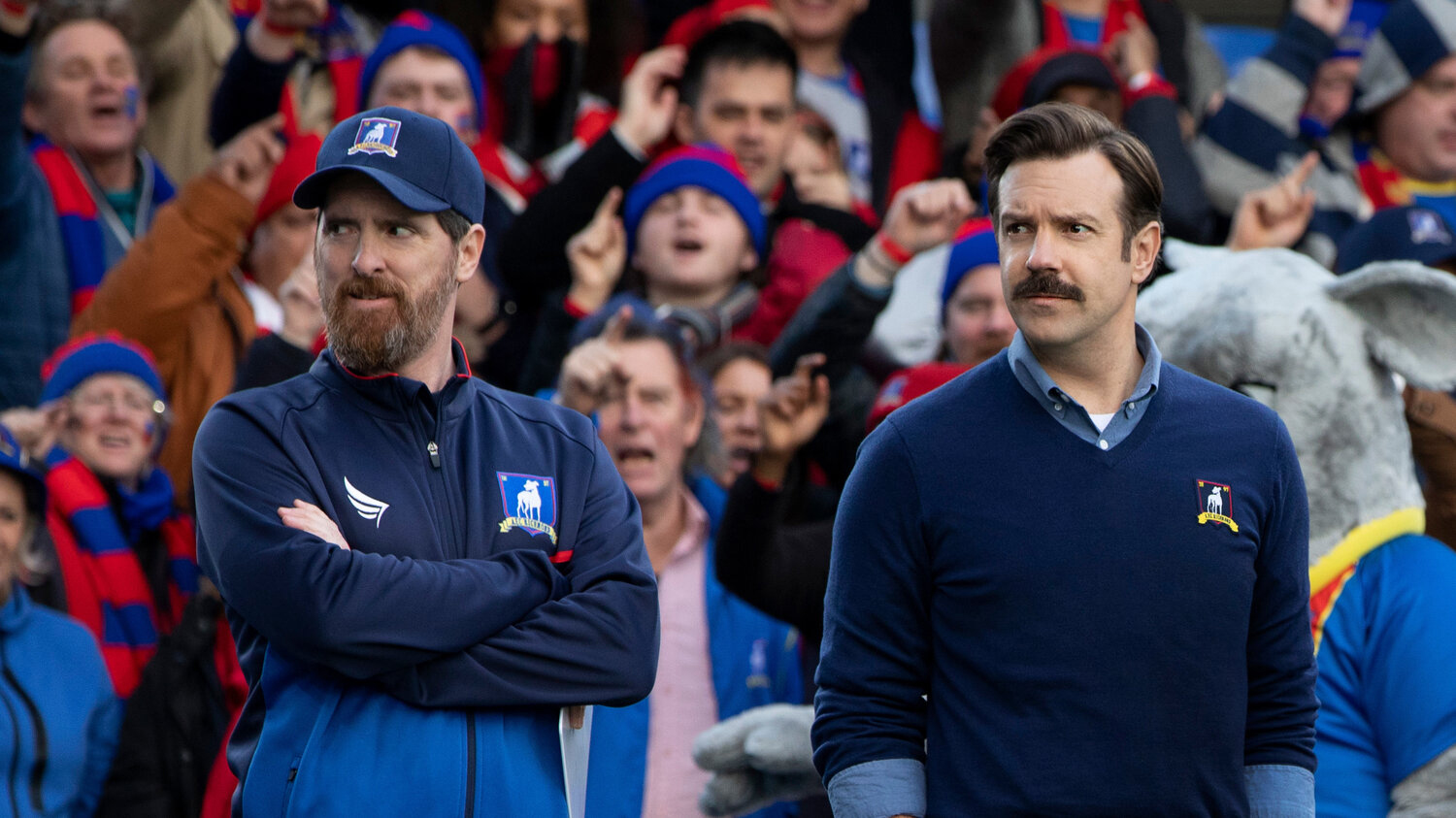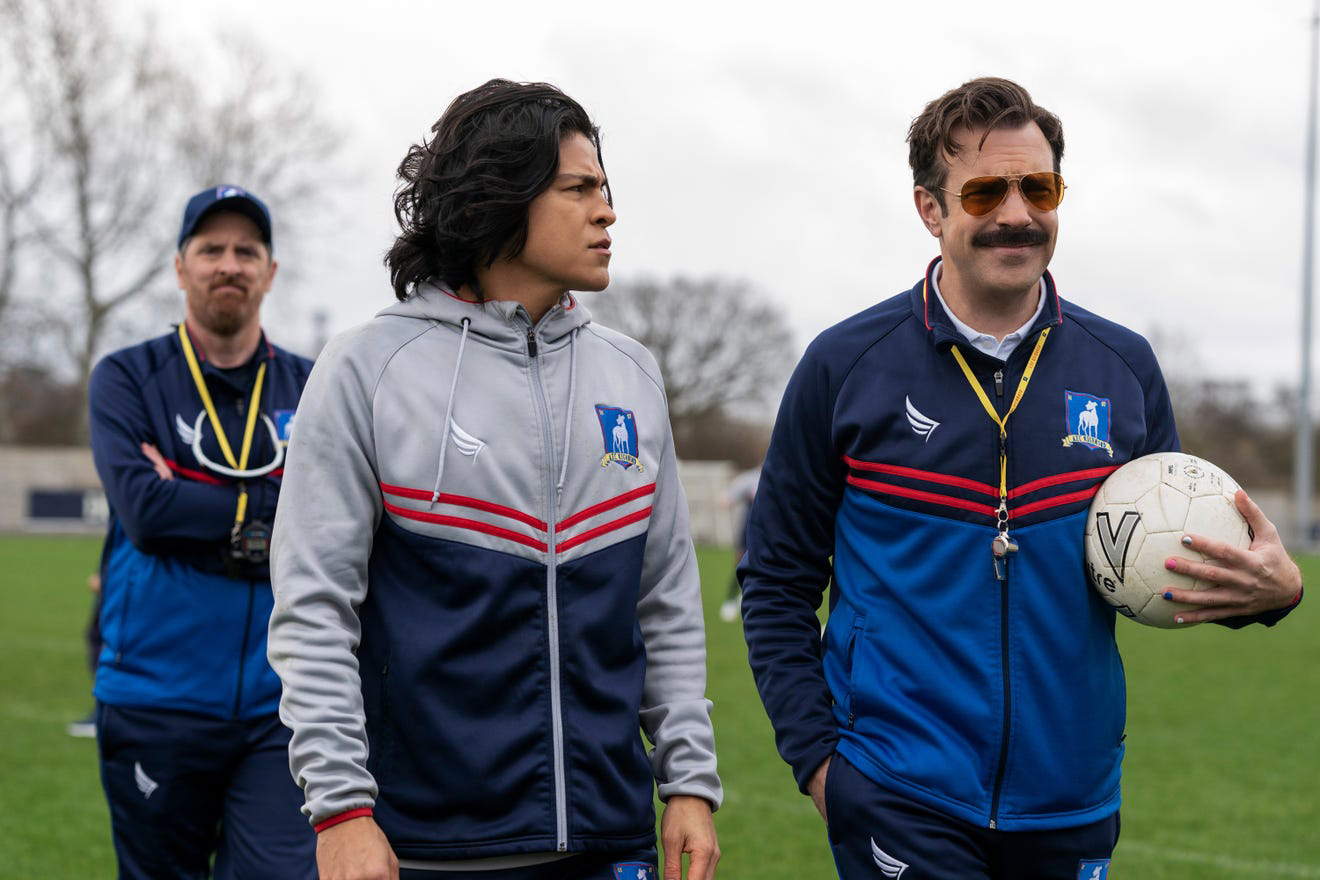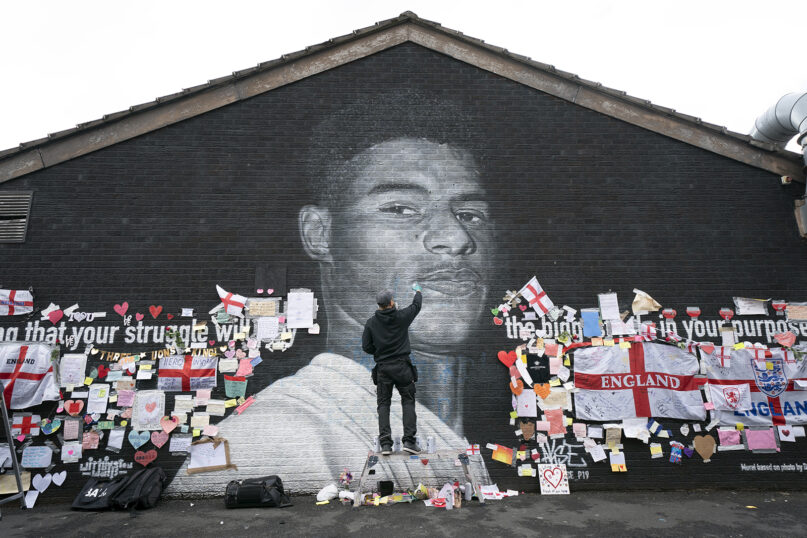(RNS) — The night of England’s heartbreaking loss in the Euro Cup 2020 championship, an angry United Kingdom football fan defaced a mural honoring the team’s three Black players, Marcus Rashford, Jadon Sancho and Bukayo Saka. Scrawled in all-caps, the graffiti declared “WE DO NOT STAND WITH 3 BLACK LIONS,” a reference to the England team’s emblem.
The graffiti capped a cascade of hate aimed at the Black England players, who each missed penalty shots during the final game. Social media harassment has been so vile it has led to five arrests and garnered a public condemnation from British Prime Minister Boris Johnson.
The abuse of the England players attracted the attention of Jason Sudeikis, who stars in “Ted Lasso,” an AppleTV+ series about an American football coach who moves to the U.K. to lead an English premier-league soccer team. On the season two premiere, Sudeikis wore a shirt that read, “Jadon & Marcus & Bukayos,” in apparent solidarity with the impacted players.
RELATED: Nike, don’t make me choose between Liverpool FC and the Uighurs
What sets “Ted Lasso” apart, to the tune of 20 Emmy nominations, is the lead character’s relentless and otherworldly reliance on kindness. In season one, Lasso arrives in London optimistic about his new venture as coach of AFC Richmond, a fictional team owned on the show by the recently and bitterly divorced Rebecca Welton, who is planning to punish her philandering ex-husband by destroying the thing he loves most: the football club. Welton has brought Lasso on to cause the team to fail.

Brendan Hunt as Coach Beard, left, and Jason Sudeikis as Ted Lasso in the Apple TV+ series “Ted Lasso.” Photo courtesy of Apple TV+
Lasso (spoiler alert) overcomes the mounting obstacles — a divided team, a cocky star player, the dubious boss, his own severe lack of knowledge of the sport — with kindness. At every turn, where we expect retaliation, anger or outrage, Lasso returns to his offender unvarnished hope and gratitude. When Lasso does slip, his apologies are immediate; he carries no grudges.
It’s captivating. The players, management, press and dubious fans who encounter Lasso are stunned by his refusal to turn toward self-protection, excuses or stinging comebacks. He flatly states that his goal isn’t to win matches. He wants to help form better men through sports. That’s the prize for the work of coaching.
Lasso offers a striking image of masculinity, untethered to traditional male norms of self-sufficiency and emotional protectiveness. As a coach, Lasso invests in relationships, seeing them as the keys to a successful life, not just a successful football career. He has friends — real friends, the kind who offer discernment, support and space for emotional relating. These characteristics usually show up on TV in women’s solidarity trips to the ladies’ room.
This is a far cry from the world of British premier-league soccer that provides the show’s actual setting. As I binged the show on a recent vacation, I took breaks to watch the Euro Cup. I’m an occasional soccer fan, mostly in it for the big events like the World Cup. But even my casual interest was enough for me to become aware of the horrific racialized abuses experienced by Black and brown players across all levels of the sport.
But as the tournament and the show progressed, I realized that Ted Lasso exists entirely in an alternate universe. To enjoy the show, I took to imagining it was set on an island where unexplainable forces were at work, like on “Lost.”
The United Kingdom of “Ted Lasso” is one where racial, socioeconomic and gendered power is absent and all human conflict is interpersonal. When a Nigerian player joins the team, his main plot line is about homesickness, not culture shock or encountering the racism of English football. The relentlessness of the paparazzi are a foil for the women of the show to explore broken trust, not the ingrained misogyny that plagues high-profile females in British tabloids.
“Ted Lasso” is a peek into the world of mostly white men who are untouched by political and social power, whose primary space of psychic navigation in the world is the relational. This is where the show breaks down. The feminist movement taught us that “the political is personal” — our interpersonal struggles are intertwined with our politics because real people’s lives are affected by racism, sexism and homophobia. In Ted Lasso’s alt world, politics and power barely exist.

Brendan Hunt as Coach Beard, from left, Cristo Fernández as star player Danny Rojas and Jason Sudeikis as Ted Lasso in the Apple TV+ series “Ted Lasso.” Photo by Colin Hutton/Apple TV+
I was reminded of this disconnect as I watched footage of a city council meeting I attended last December in my hometown in North Carolina. The council was deciding whether to approve a rezoning application for a rich developer in our county, who wanted to build expensive condos and luxury shopping in an area plagued by gentrification and Black pushout.
Despite a push by neighbors to secure a community benefits agreement that would ensure affordable housing and living-wage jobs on the newly developed site, the council remained steadfast in going ahead with the project as is.
During a virtual public comment session, many residents called in to share their concerns about skyrocketing property taxes and how a new luxury development would impact their ability to stay in their homes. Others talked about the affordable housing crisis in our city and its impact on their children’s schooling, friendships and quality of life. People spoke with passion, often with anger.
But what I remember most is that after each person spoke, Mayor Mary-Ann Baldwin would wish them “Happy Holidays.” If the speaker returned the greeting, Baldwin would praise them for their holiday spirit and generosity. Kindness was weaponized, a way to separate the angry Black people on the call from the calm and rational white people who understood the value of simple expressions of goodwill.
That’s the danger of “Ted Lasso.” In his review of season one, New York Times critic Mike Hale reflected that “it’s as if Sudeikis et al foresaw the chaos and terror of the summer of 2020 and wanted to prove that America could do something right.” The “chaos and terror” Hale refers to is the Black Lives Matter protests of 2020, when millions took to the streets to demand an end to police violence. The “something right” is an alternative of positivity and kindness.
I admit that I was also pulled into the world of “Ted Lasso.” Maybe, I thought, kindness could change the world. In an interview about season two, Sudeikis said, “One of the themes is that evil exists — bullies, toxic masculinity, malignant narcissists — and we can’t just destroy them. It’s about how you deal with those things. That’s where the positivity and some of the lessons come in — it’s about what we have control over.”
Positivity and kindness may break down personal defenses. From time to time, kindness can even be transformative. But soothing tensions can also distract from the work it takes to confront iron-clad systemic power that is inseparable from the personal lives of the people who are crushed by it.
The balm that “Ted Lasso” offers is to pretend, just for a little while, that this isn’t the case. In truth, we need stronger medicine.
(Melissa Florer-Bixler is pastor of Raleigh Mennonite Church and a writer for “Abolish the Police?,” an abolition curriculum for churches. Her book “How to Have an Enemy: Righteous Anger and the Work of Peace” was published in July 2021. The views expressed in this commentary do not necessarily reflect those of Religion News Service.)





